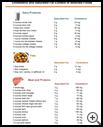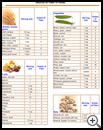
Gallbladder Diet
________________________________________________________________________
KEY POINTS
- Changing your diet won’t help you get rid of gallstones, but it may help lessen your symptoms and prevent new stones.
- Being overweight is an important risk factor for gallbladder disease. Controlling your weight can make it less likely that your body will make gallstones.
- Most gallstones are made from cholesterol. A diet high in fiber and low in saturated fat and cholesterol can help prevent or lower cholesterol levels. Regular exercise may also help reduce cholesterol in the gallbladder and bile ducts and help prevent gallstones.
________________________________________________________________________
How can diet help gallbladder problems?
Diet doesn’t directly cause or cure gallbladder problems. However, there are changes you can make in your diet that may help prevent gallstones.
Gallstones are hard stone-like objects that build up in the gallbladder. They may be as small as a grain of sand to as large as a golf ball.
The liver and gallbladder are part of your digestive system. The liver makes bile that helps your body break down the fat in food. Ducts carry bile from the liver to the gallbladder and small intestine. The gallbladder is a small sac under your liver on your right side that stores bile.
If stones completely block the gallbladder or bile duct, the flow of bile out of the liver can also be blocked. This causes swelling, irritation, and pain in your liver, your gallbladder, or both. If not treated, swelling can cause your gallbladder to burst, or you could get a serious infection. Both can be life-threatening.
What changes should I make in my diet?
Most gallstones are made from cholesterol. If there is too much cholesterol in your bile or if the bile stays in your gallbladder too long, hard pieces (stones) can form. Your body makes some cholesterol and gets the rest from foods such as meats, eggs, and some milk products. Changing your diet won’t help you get rid of gallstones, but it may help lessen your symptoms and prevent new stones.
If you are overweight, eating a healthier diet can help you lose weight. Being overweight is an important risk factor for gallbladder disease. Controlling your weight can make it less likely that your body will make gallstones. If you decide to lose weight, be careful about how you do it. Losing weight too fast, “yo-yo” dieting, and fasting may increase the risk of gallstones. It’s best to aim to lose 1 to 2 pounds a week. Check with your healthcare provider about the best way for you to lose weight.
Eating foods high in saturated fat and cholesterol and low in fiber may increase your risk of obesity, type 2 diabetes, and high cholesterol levels. These health problems may increase your risk for gallbladder problems or make them worse. Fatty food may make the gallbladder squeeze more as it tries to empty bile into the intestine. This can increase your pain if gallstones are blocking the flow of bile.
Try to eat a variety of healthy foods:
- Eat more fruits, vegetables, and whole grains.
- Get more protein from vegetables, such as soybeans and soybean products.
- Eat lean meat, fish, and poultry.
- Eat and drink low-fat milk products, like skim milk and low-fat yogurt.
- Eat foods that contain monounsaturated fats, such as olive or canola oil, peanuts, tree nuts, and omega-3 fats (found in canola oil, flax seed, walnuts and fish oils, for example).
Avoiding these high-calorie foods can help you keep a healthy weight:
- Fatty red meat
- Whole-milk and whole-milk products, like butter, cheese, and ice cream
- Fried or greasy foods
- White sugar or corn syrup, which is often in cakes, pies, and cookies
Drinking caffeinated coffee every day may help lower the risk of gallstones. The caffeine in coffee is thought to help bile move through the gallbladder and help it empty. This could lower the cholesterol in the bile. Drinking other caffeinated drinks, such as soda or tea, has not shown the same benefit.
Be sure to exercise regularly. It helps you get to and keep a healthy weight. Regular exercise may also help reduce cholesterol in the gallbladder and bile ducts. This may also help prevent gallstones.
Do I need to follow a special diet after gallbladder surgery?
After gallbladder surgery, you can usually eat a regular diet when you go home from the hospital. Always follow your healthcare provider’s instructions about changes you need to make in your diet after surgery.


